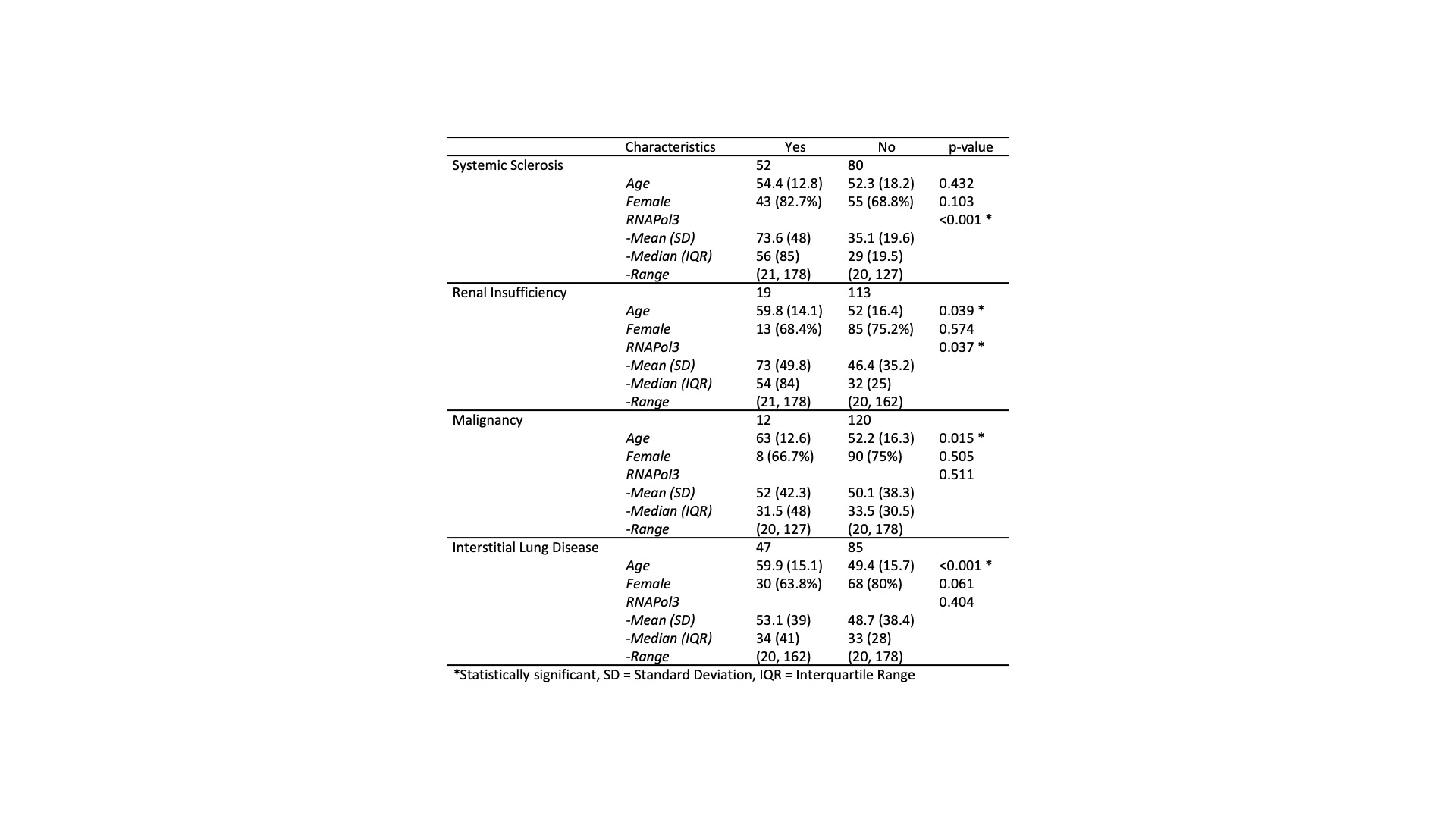Session Information
Date: Monday, November 8, 2021
Title: Systemic Sclerosis & Related Disorders – Clinical Poster II (1364–1390)
Session Type: Poster Session C
Session Time: 8:30AM-10:30AM
Background/Purpose: Autoantibodies are included in the disease classification criteria for systemic sclerosis (SSc). Our group previously reported the level of topoisomerase autoantibody as an important factor for disease classification (Tebo, et al, J. Rheumatology, 46(4) 440-442, 2019). This project analyzed the level of anti-RNA polymerase 3 (RNApol3) antibodies in a cohort of patients assessed for autoimmune disease at a large academic institution.
Methods: 1555 patients were assessed for autoimmune disease under IRB #00029507. RNApol3 antibody positivity (≥20 units) was detected in 132 patients. Two investigators manually reviewed the clinical records for these patients and recorded age, sex, disease classification and disease features. The statistical hypothesis testing methods for age, gender, and RNApol3 are Student’s t-test, Fisher’s exact test and Wilcoxon rank-sum test, respectively.
Results: Among the 132 patients with a positive RNApol3 antibody, 80 did not meet classification criteria for SSc at the time of the assessment (Table 1). The 52 patients that did meet criteria for SSc had a higher level of RNApol3 antibody, with an optimal cut-off level of 27 units (Figure 1). Age and sex were not significantly different in the two groups of RNApol3 antibody positive patients with and without SSc. In the SSc patient population, age and RNApol3 level >81 units was significantly correlated with the presence of renal insufficiency (Figure 1). The presence of malignancy and ILD was significantly correlated to age but not level of RNApol3 antibody.
Conclusion: Our study supports that the level RNApol3 antibody may be important in classification criteria for SSc. Similarly, in the SSc cohort of patients with a positive RNApol3 antibody, the level may correlate with renal insufficiency. Our study did not find that the level of RNApol3 antibody correlated with ILD or malignancy.
 Table 1: Clinical and laboratory characteristics of patients with RNApol3 positivity. Descriptive statistics used for age and gender are Mean(SD) and Number(%)
Table 1: Clinical and laboratory characteristics of patients with RNApol3 positivity. Descriptive statistics used for age and gender are Mean(SD) and Number(%)
 Figure 1: ROC curves and AUCs with 95% CIs (DeLong method). The red dots refer to the false positive rate (FPR) and true positive rate (TPR) of the optimal cutpoint.
Figure 1: ROC curves and AUCs with 95% CIs (DeLong method). The red dots refer to the false positive rate (FPR) and true positive rate (TPR) of the optimal cutpoint.
To cite this abstract in AMA style:
Kirkpatrick M, Lee J, Tebo A, Li H, zhang y, Frech T. Presence of Anti-RNA Polymerase 3 Antibody in Systemic Sclerosis, Renal Disease, Malignancy and ILD from a Single Academic Center Cohort [abstract]. Arthritis Rheumatol. 2021; 73 (suppl 9). https://acrabstracts.org/abstract/presence-of-anti-rna-polymerase-3-antibody-in-systemic-sclerosis-renal-disease-malignancy-and-ild-from-a-single-academic-center-cohort/. Accessed .« Back to ACR Convergence 2021
ACR Meeting Abstracts - https://acrabstracts.org/abstract/presence-of-anti-rna-polymerase-3-antibody-in-systemic-sclerosis-renal-disease-malignancy-and-ild-from-a-single-academic-center-cohort/
